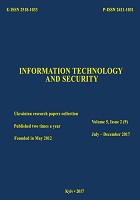Scenario research based on analysis of information space
DOI:
https://doi.org/10.20535/2411-1031.2017.5.2.136921Keywords:
Scenario analysis, analytical activity, information operations, network of terms, scenario modeling.Abstract
A method to developing scenarios for the development of a situation is proposed, which allows solving a problem of formation and ranking scenarios for implementing impacts on objects that correspond to the selected key concept in the automatic processing mode. From the array of documents belonging to a certain subject area, identified key concepts, which can be separate words, bigrams or trigrams. The subject area graph formed, between the received key concepts, using weight criteria. By expert evaluation, the graph edited and numerical values assigned to his edges, to form a network of subject domain concepts. Within the framework of the model, the weighing of individual network nodes corresponding to the terms is done using a modified algorithm HITS (Hyperlink-Induced Topic Search). Modification of the algorithm provides that when calculating the weight value of each node, the weight of the edges taken into account. To reduce the effect of the uneven distribution of weight values on the result, the weight of the node is multiplied by a monotonically increasing, less steep than a linear function. Building an ontology allows taking into account general factors and interrelations between them and develop several computer scenarios considering alternative possible outcomes. Open-source network analysis software package Gephi, ontology development environment Protégé and an original package of specially developed Perl modules are used for simulation and visualization. To test the method a network of domain concepts was formed by scanning the Internet on the topic BREXIT and then analyzed. Visualization of the subject domain allows the analyst to explore the resulting scenarios and generate results in a convenient form for decision-making. The method can be used in scenario modeling, information security analysis and decision-making support.
References
M.Z. Zgurovsky, and N.D. Pankratova, Technological foresight. Кyiv, Ukraine: Politekhnika Publishing House, 2005.
A.G. Dodonov, D.V. Lande, and T.V. Kovalenko, “Models of subject domains in decision-making support system on the basis of information space monitoring”, in Proc. VIth internetional conference Open Semantic Technologies for Intelligent Systems, Мinsk, 2016, pp. 171-176.
M.Z. Zgurovsky, and N.D. Pankratova, The foundations of system analysis, Кyiv, Ukraine: Publishing group ВНV, 2007.
P.J.H. Schoemaker, “Multiple scenario development: its conceptual and behavioral foundation”, Strategic Management Journal, Vol. 14, Iss. 3, pp. 193-213, 1993.
doi: 10.1002/smj.4250140304.
B. Hassani, Scenario analysis in risk management. Gewerbestrasse, Switzerland: Springer International Publishing, 2016.
doi: 10.1007/978-3-319-25056-4.
V.L. Shulz, V.V. Kulba, A.B. Shelkov, and V.V. Chernov, “Scenario analysis of the effi ciency of management of the information support of the state policy of Russia in the Arctic territory”, National Security / nota bene, № 6 (17), pp. 104-137, 2011.
D. Amyot, and A. Eberlein, “An evaluation of scenario notations and construction approaches for telecommunication”, Telecommunications Systems Journal, Vol. 24, Iss. 1, pp. 61-94, September 2003.
D.V. Lande, and A.A. Snarskij, “Approach to the creation of terminological ontologies”, Ontology of Designing, № 2 (12), pp. 83-91, 2014.
J. Kleinberg, “Authoritative sources in a hyperlinked environment”, Journal of the ACM, Vol. 46, Iss. 5, pp.604-632.
doi: 10.1145/324133.324140.
Downloads
Published
How to Cite
Issue
Section
License
Copyright (c) 2020 Collection "Information technology and security"

This work is licensed under a Creative Commons Attribution 4.0 International License.
The authors that are published in this collection, agree to the following terms:
- The authors reserve the right to authorship of their work and pass the collection right of first publication this work is licensed under the Creative Commons Attribution License, which allows others to freely distribute the published work with the obligatory reference to the authors of the original work and the first publication of the work in this collection.
- The authors have the right to conclude an agreement on exclusive distribution of the work in the form in which it was published this anthology (for example, to place the work in a digital repository institution or to publish in the structure of the monograph), provided that references to the first publication of the work in this collection.
- Policy of the journal allows and encourages the placement of authors on the Internet (for example, in storage facilities or on personal web sites) the manuscript of the work, prior to the submission of the manuscript to the editor, and during its editorial processing, as it contributes to productive scientific discussion and positive effect on the efficiency and dynamics of citations of published work (see The Effect of Open Access).

